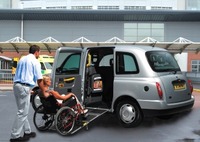Taxi access recomendations for Europe – what about UK?
 In 2006 discussions took place to devise a suitable set of specifications for accessible taxis across Europe. Earlier this year these proposals were approved by the European Conference of Ministers of Transport, (ECMT).
In 2006 discussions took place to devise a suitable set of specifications for accessible taxis across Europe. Earlier this year these proposals were approved by the European Conference of Ministers of Transport, (ECMT).The proposed specifications for accessible taxis have now been sent to all member states in the hope that EU member governments, as well as local licensing authorities in cities and towns throughout Europe, will adopt them. The specifications are considered in some cases to be aspirational but they also lay down what the ECMT considers to be the future minimum requirements.
The new proposals from the ECMT and the International Road Transport Union (IRU) were compiled in consultation with motor manufacturers, purpose built taxi manufacturers and taxi conversion companies. The new proposals take into account the work already done on access regulations by countries such as France, the UK and Belgium.
The IRU represents the entire road transport industry worldwide and speaks for the operators of coaches, taxis and commercial vehicles.
The theme of the new proposals appears to have been one of not letting the ‘perfect’ get in the way of the ‘possible’. The proposals deliver a series of recommendations that are both practical in manufacturing terms and affordable to the taxi trade in the hope that real progress can be made. The proposals cover future facilities for wheelchair users as well as catering for passengers with all types of disabilities including the hearing and sight impaired.
It will be up to individual countries to decide how they wish to use these recommendations and bring them into force.
The Irish Government has already acted upon these recommendations and they have proposed a draft specification for accessible taxis based around the minimum recommendations in this document. They are keen to see more accessible cabs being introduced and feel that the standards outlined will form a solid foundation on which to build for the future.
The UK Government has a long standing commitment to introduce accessibility regulations for taxis under the 1995 Disability Discrimination Act, but after 12 years, still no draft specification has been revealed.
Disability groups and local authorities hope that following this prompt from the EU the British Government will now find a way forward by adopting the minimum specification outlined in this ECMT document in line with other European countries.
With the new Minister, the Right Hon. Rose Winterton MP taking responsibility for this issue, the disability community hopes she will now finally confirm that the Department for Transport will adopt these new specifications.
Local authorities up and down the country that regularly review their taxi regulations have been asking for some direction on future recommended minimum specification for suitable vehicles. They have in the past been encouraged by the Department for Transport to introduce ‘accessible’ cabs, but with no clear definition on the real meaning of ‘accessibility’.
The Department for Transport has in recent years introduced accessibility regulations for trains and buses and the industry feels it is logical to develop an integrated transport strategy that includes taxis as they are a vital link in the system providing on-demand 24/7 door to door transport.
A recent Parliamentary Motion signed by over 100 MPs sought to urge the Government to introduce regulations for the benefit of disabled people in regard to licensed taxis. Currently the UK has more fully accessible taxis than any other EU country but it is in danger of being left behind if they do not adopt the ECMT proposals.
Two years ago, the then Minister for Transport, Tony McNulty, announced the changeover to wheelchair accessible taxis would start in 2010. Organisations such as RADAR and the Spinal Injuries Association and all disabled passengers hope this is still the timescale.
Richard Daniels, Government Affairs Manager for LTI Vehicles, Coventry, manufacturers of the purpose built London style taxi said, “All our taxis are fully wheelchair accessible and have other facilities for the hard of hearing and the sight impaired. We sell them all over the world but as we start to design the next generation of vehicles it is vitally important we know soon what the future legislation will be, especially for the UK, our largest current market.”
Currently the UK has over 75,000 licensed taxis that can be hailed on the street or at a taxi rank. This total does not include private hire vehicles or licensed minicabs that have to be pre-booked.
The British Government had previously announced that all Phase One Licensing Authorities and larger cities and towns in the UK would need to change their licensing regulations regarding the use of saloon cars as taxis. Over 19,000 cars will have to be replaced by wheelchair accessible taxis in a ten year period, but no starting date has yet been agreed for the implementation of this regulation.
The Disabled Groups like RADAR and others hope this latest EU initiative on taxi access will spur the British Government into action.

